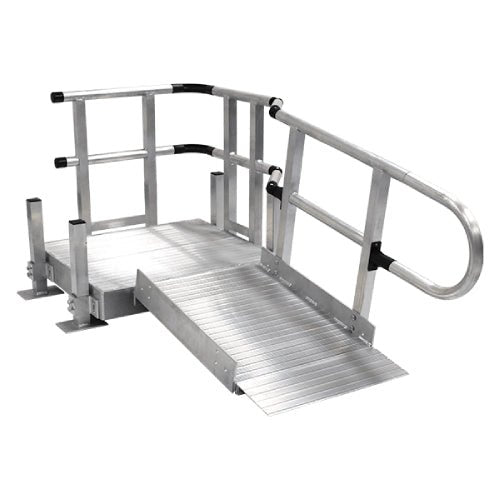Open 6 Days a Week
Modular Wheelchair Ramps
Modular wheelchair ramps offer a versatile solution for improving home accessibility. These ramps enhance home accessibility by accommodating mobility needs. These ramps offer flexibility due to their customizable designs, which fit various home or businesses.

Customizable Modular Wheelchair Ramps
What Are Modular Wheelchair Ramps?
Modular wheelchair ramps offer a versatile solution for improving home accessibility. These ramps enhance home accessibility by accommodating mobility needs. These ramps offer flexibility due to their customizable designs, which fit various home or businesses layouts. Installation is straightforward, making them a practical choice for swiftly improving safety and convenience. By choosing from a range of materials and designs, you ensure that the ramp complements your home's aesthetic. Creating an inclusive environment becomes easier with modular solutions tailored to your specific requirements.
Modular Design
Modular wheelchair ramps feature a step-by-step assembly process with interchangeable sections. Each unit typically includes platforms, handrails, and securing hardware. This design allows you to adjust the ramp to fit various home configurations without extensive construction work.
Customizable Fit
These ramps adapt to different entryways and elevations by offering adjustable lengths and configurations. You can select from multiple materials like aluminum or steel that align with your home's aesthetic. The modular system ensures that you achieve the best fit for specific space needs while maintaining visual harmony.
Permanent and Semi-Permanent Use
Options for permanent or semi-permanent residential wheelchair ramps allow for flexibility based on your needs. Permanent residential ramps provide long-term accessibility solutions, securely fastened into place. Semi-permanent models can be more easily disassembled or relocated.
ADA Compliance
All of Harmony Home Medicals modular ramps meet ADA specifications, ensuring safety and ease of use. These ramps feature non-slip surfaces, appropriate slope ratios, and handrails, making them suitable for individuals with mobility challenges.
Key Features of Modular Wheelchair Ramps for Homes
Modular wheelchair ramps for homes offer essential features tailored for safety and durability. These features ensure accessibility while maintaining a stylish appearance.
- Durable Construction Materials : Modular ramps use durable materials such as aluminum, steel, and wood. Aluminum modular ramps, our most popular because they are lightweight and rust-resistant. Steel provides high load capacity, making it ideal for heavy-duty requirements. Wood offers a natural aesthetic that blends with your home.
- Non-Slip Surface : Our modular ramps feature non-slip surfaces. Textured treads or grip tape reduce the risk of slips regardless of weather conditions. This ensures stable footing, enhancing the confidence of users and caregivers.
- Weather Resistance : Weather-resilient ramps withstand diverse climatic conditions. Aluminum and/or powder coatings protect against rust and corrosion, extending the ramp's lifespan.These are UV-resistant helping prevent fading, ensuring its appearance over time.
- Expandable Design : Modular ramps offer flexibility through expandable designs. By easily adding or removing sections, you adapt the ramp to fit changing needs or reconfigure it for different entryways
Benefits of Modular Wheelchair Ramps for Homes
Modular wheelchair ramps offer practical and versatile solutions to improve home accessibility. They provide customizable options to fit diverse needs and environments.
Accessibility for All Entrances
Modular ramps accommodate various entry points. They can extend to porch steps, backdoors, or garage entries, ensuring every entrance becomes easily navigable for those with mobility challenges.
Adaptable to Terrain
Modular ramps adapt to different terrains effectively. Their designs allow adjustments for varying gradients and outdoor surfaces. Whether you have a steep driveway or a grassy yard, the ramp's configuration can be adjusted to create a stable and smooth pathway.
Cost-Effective Solution
When it comes to budget concerns, modular ramps present an economical option. They often require fewer materials and less labor for installation compared to permanent structures. The simplicity of assembly can reduce overall costs, making them an affordable choice for increasing home accessibility.
Reusable and Reconfigurable
One of the key advantages of modular ramps is their reusability and ease of reconfiguration. You can dismantle and relocate the ramp if you decide to move or adjust its design to meet changing needs. This flexibility allows for continued use as mobility requirements evolve or change.
How to Choose the Right Modular Wheelchair Ramp for Your Home
- Ramp Length
Determine the appropriate ramp length by measuring the rise of the entryway. For each inch of vertical rise, a 12-inch horizontal ramp length is typically recommended to meet ADA guidelines. Adjust the length to match space constraints and user needs, ensuring adequate slope for safe navigation. - Weight Capacity
Choose a ramp that supports the maximum weight it will bear. Consider the wheelchair user's weight along with the wheelchair itself and any accessories. Check manufacturer specifications to ensure the ramp supports at least 600 pounds, which is standard for most residential ramps. - Material Selection
Pick materials that suit your environment and personal preference. Aluminum ramps are lightweight and rust-resistant, while steel options offer enhanced durability. Wood ramps provide a natural look but may require more maintenance. Evaluate each material's cost, maintenance needs, and durability. - Handrails and Safety Features
Ensure ramps include necessary safety features. Handrails offer stability, and non-slip surfaces increase safety during wet or icy conditions. - Weather Conditions
Consider local weather conditions when selecting a ramp. Opt for weather-resistant materials and coatings to prevent rust and UV damage in harsh climates and ramps with drainage systems to handle rain and snow, allowing year-round use.
Applications of Modular Wheelchair Ramps in Residential Settings
Modular wheelchair ramps provide vital accessibility in residential areas, enhancing mobility for individuals with varying needs. Their adaptability and ease of installation make them suitable for several home access points and use cases such as:
- Front Door and Porch Access
- Garage and Backyard Access
- Temporary Ramps for Recovery
- Elderly Care at Home
- Adaptations for Rental Properties
Installation Process for Modular Wheelchair Ramps
Modular wheelchair ramps offer a straightforward installation process due to their pre-engineered components. Following a structured approach ensures safety and efficiency.
Site Assessment
Evaluate your home's entryway before installing a modular wheelchair ramp. Measure the height and slope, considering ADA guidelines. Identify potential obstacles like uneven surfaces or vegetation around the installation area. Ensure the location offers enough space for ramp length and safe access.
Assembly Guidelines
Modular wheelchair ramps come with clear assembly instructions and labeled components. Organize all parts before starting, ensuring you have each section easily accessible. Follow the manufacturer's step-by-step guide, connecting each module systematically. Verify alignment and stability during assembly to maintain structural integrity.
Easy Installation Options
Fast and straightforward assembly is a hallmark of modular ramps. Designed for minimal disruption, these ramps come with clear instructions and require basic tools. This simplicity allows you to install them without professional help, saving time and money.



